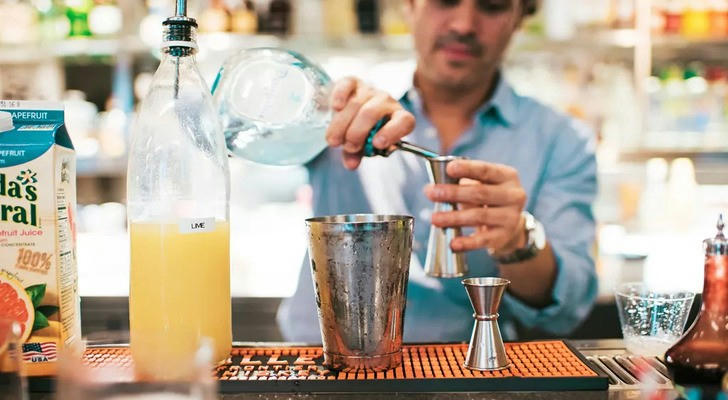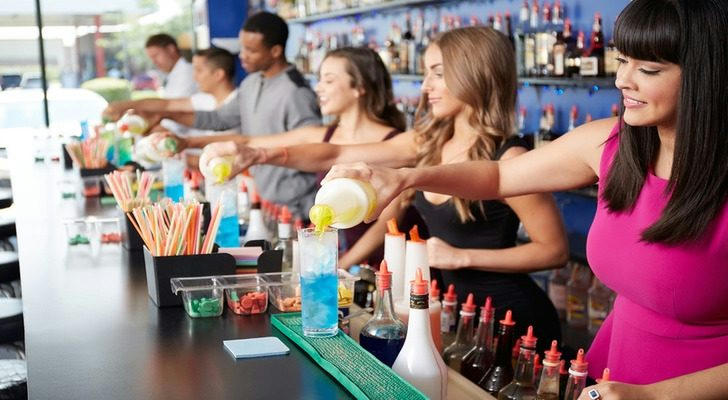Common Reasons for Failing Bartender Certification Exams & 5 Tips to Avoid Pitfalls
Becoming a certified bartender can be a rewarding career move. Not only does it open doors to higher-paying positions, but it also increases job stability and career growth. However, passing the bartender certification exam isn't always as simple as mixing drinks. Many aspiring bartenders face challenges when taking the exam, and some fail to earn their certification on their first attempt. To help you avoid common pitfalls, let's dive into why some people fail and explore 5 key tips to boost your chances of success.

Common Reasons for Failing Bartender Certification Exams
1.Lack of Proper Preparation
One of the main reasons candidates fail the bartender certification exam is inadequate preparation. The exam isn't just about knowing how to mix a few classic cocktails; it covers a broad range of topics, including customer service skills, bar equipment, drink recipes, alcohol laws, and the ability to work under pressure. Without comprehensive study, it can be difficult to pass.
According to the National Bartender Certification Association, approximately 30% of first-time test-takers fail due to insufficient preparation. Bartenders must have a deep understanding of drink ingredients, techniques, and safety protocols. Without these skills, your chances of passing drop significantly.
2.Nervousness and Stress
Exam anxiety is a common issue, especially for people who are not used to performing under pressure. Many candidates get flustered by the timed nature of the exam, or they may worry about making mistakes in front of the examiner. This nervousness can lead to simple errors like forgetting ingredients or making drinks incorrectly.
In fact, studies show that test anxiety can reduce performance by as much as 20-30%, particularly in practical exams where your skills are being observed in real-time. If you’re nervous, you may struggle to showcase your true abilities.
3.Inconsistent Practice and Training
Even though many bartenders are hands-on professionals, consistent practice is key to mastering the art of mixology. Inconsistent practice and lack of training can leave you unprepared for specific scenarios or techniques that are part of the certification exam. Some candidates focus only on the most popular drinks, neglecting the more obscure or complicated recipes that may appear on the test.
One survey found that 40% of failed candidates did not practice mixing drinks regularly, making them less proficient when it came to executing complex orders.
4. Missing Key Details in the Exam's Criteria
Bartender certification exams often have specific requirements that test not only your drink-making skills but also your knowledge of safety standards, customer interaction, and bar management. Missing any of these elements can result in a failed exam. Candidates who don't fully understand the nuances of the exam's criteria may neglect key aspects like measuring ingredients precisely or following health and safety regulations.
A study by the Bartender's Guild revealed that 20% of failures were due to candidates overlooking safety protocols or failing to follow the exact instructions given by examiners.

5 Tips to Avoid Pitfalls & Pass Your Bartender Certification Exam
1. Create a Detailed Study Plan
The best way to ensure success is to have a study plan that covers all the material you'll be tested on. Break down the topics into manageable sections, such as drink recipes, bartending techniques, alcohol laws, and customer service. Allocate time each day to practice specific skills, like cocktail shaking, muddling, or garnishing. Using resources like bartending textbooks, online courses, or mock exams can help reinforce your knowledge.
Tip: Consider creating flashcards for common drink recipes or bartending terms to help you memorize key details.
2. Practice Under Time Pressure
Since the exam is usually timed, practicing under similar conditions will help you stay calm during the real test. Set a timer and try to make cocktails as quickly and accurately as possible. Also, focus on multitasking—serving drinks, taking orders, and interacting with customers all at once. This can mimic the real-world experience of working in a bar.
Studies indicate that candidates who practice under time constraints are 40% more likely to pass because they develop a better sense of pacing and prioritize tasks effectively.
3. Focus on the Practical Elements
While theoretical knowledge is essential, your practical skills as a bartender are equally important. Make sure to master the basic techniques, such as shaking, stirring, pouring, and garnishing. Practice mixing both classic and contemporary cocktails to ensure you're prepared for any drink requests that might come up on the exam.
Tip: Focus on mastering the must-know drinks, such as the Old Fashioned, Margarita, Martini, and Mojito. These are often part of the exam, and being proficient in them will give you an edge.
4. Familiarize Yourself with Bar Equipment
During the exam, you'll be tested on your ability to use bar tools correctly. Ensure that you know how to handle and clean equipment like shakers, strainers, jiggers, and muddlers. Understanding how each tool functions will help you work more efficiently and with precision, which is crucial during the exam.
Tip: When practicing, simulate real-life conditions by setting up your workstation with the proper tools and practicing drink-making sequences.
5. Stay Calm and Confident
Confidence plays a significant role in how well you perform during the exam. Even if you make a small mistake, don’t let it throw you off. A calm demeanor helps you think clearly, handle challenges effectively, and focus on completing the tasks at hand.
Remember, examiners are looking for candidates who can demonstrate competence under pressure. Keeping your cool will not only help you stay organized but also show the examiner that you’re capable of managing a busy bar.
Final Thoughts: Bartender Certification & Career Benefits
Bartender certification can significantly increase your earning potential and job opportunities. According to the U.S. Bureau of Labor Statistics, certified bartenders earn about 10-15% more than those without certification. Additionally, certified bartenders are often given more responsibility, leading to quicker promotions and greater career stability.
By preparing thoroughly, practicing consistently, and staying calm during the exam, you'll be in a great position to pass and enjoy the benefits of a certified bartender career.
